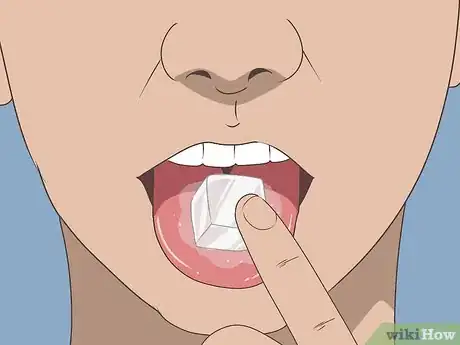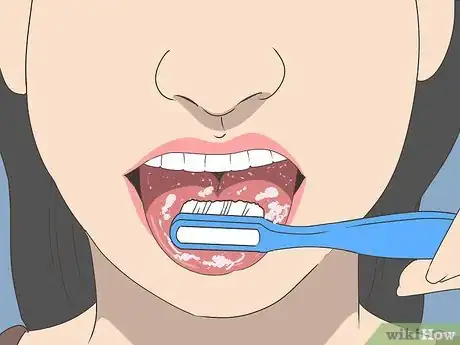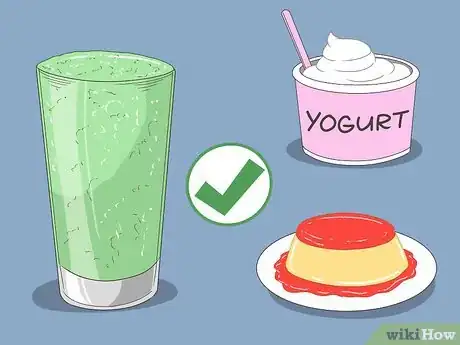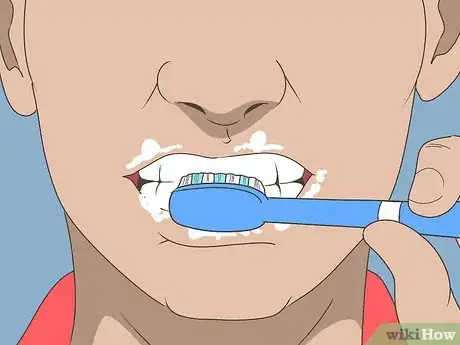This article was co-authored by Luba Lee, FNP-BC, MS and by wikiHow staff writer, Hannah Madden. Luba Lee, FNP-BC is a Board-Certified Family Nurse Practitioner (FNP) and educator in Tennessee with over a decade of clinical experience. Luba has certifications in Pediatric Advanced Life Support (PALS), Emergency Medicine, Advanced Cardiac Life Support (ACLS), Team Building, and Critical Care Nursing. She received her Master of Science in Nursing (MSN) from the University of Tennessee in 2006.
This article has been viewed 92,773 times.
Enjoying your favorite meal is much harder when your taste buds are inflamed. Swollen or irritated taste buds are pretty common, and they can happen for any number of reasons (burning your tongue, eating spicy/acidic foods, having dry mouth, or even allergies). If you have inflamed taste buds, it might seem like you’ll never be able to enjoy food again—but don’t worry! There are a few ways you can soothe your irritated buds to get some relief. If your taste buds are consistently inflamed or they don’t heal after a few days, talk to a doctor.
Steps
Quick Relief
-
1Press an ice cube against your tongue. When your taste buds are inflamed, it can help to cool them down with a bit of ice. Pop an ice cube in your mouth and hold it against your tongue as it melts. If it’s too cold you can spit it out; otherwise, keep it in there until it’s gone.[1]
- You can suck on an ice cube 2 to 3 times per day until your taste buds feel better.
-
2Try a saltwater mouth rinse twice a day. Mix hot water and 1 tbsp (14 g) of salt in a small bowl. Take a large sip of the water and swish it around your mouth for as long as you can, then spit it out. Repeat this until your taste buds feel a little better.[2]
- Salt has anti-inflammatory effects, so it can help to soothe your taste buds.
Advertisement -
3Take pain relievers. Anti-inflammatories, like ibuprofen and paracetamol, can help relieve the pain of your sore taste buds and make the swelling go down faster. Follow the dosage instructions on the bottle of your pain medication to find some relief.[3]
- You can find these pain relievers over the counter at most drug stores.
-
4Brush your tongue with a soft toothbrush. If your taste buds are inflamed, they could still be irritated by something in your mouth or on your tongue. Use a soft toothbrush and toothpaste to carefully brush your teeth, then lightly go over your tongue, too.[4]
- Toothbrushes usually come in hard or soft bristles. Try to grab one where the bristles are soft, not hard and stiff, so you don’t hurt your tongue even more.
-
5Drink cool drinks through a straw. To soothe your inflamed tongue, pour yourself a glass of cool water (no ice!) and grab a straw. Take slow sips, being sure to coat your tongue in the soothing coolness of your drink.[5]
- The straw will help direct the coldness of your drink onto your taste buds.
-
6Stick with water instead of alcohol or sugary drinks. Alcohol and drinks with lots of sugar in them, like soda and juice, can inflame your taste buds even more. Try to stick to drinking water as you heal your tongue to soothe it and make the swelling go away faster.[6]
- Staying hydrated can also help prevent inflamed taste buds in the future.
-
7Eat soft, soothing foods, like yogurt. It can be tough to eat crunchy or hard foods when your taste buds are inflamed. Go for cool, creamy foods, like yogurt, smoothies, or pudding until your tongue heals up.[7]
- Yogurt is usually mild in flavor, too, which makes it perfect for an inflamed tongue.
-
8Try oil pulling with coconut oil. Oil pulling can help relieve pain from mouth sores. Put 1 tablespoon (15 ml) of coconut oil in your mouth first thing in the morning before you eat. Slowly swish the coconut oil between your teeth for 20 minutes. When you’re finished, spit the oil in your trash can.[8]
- If your jaw hurts, it may mean you’re using too much oil. You can also reduce the time to 5–10 minutes if your jaw really aches.
-
9Avoid spicy, acidic foods. Spicy and acidic foods may actually be the cause of your swollen taste buds, so you should avoid them at all costs. Hot sauce, chili peppers, citrus juice, and heavy spices can all make your inflamed taste buds much worse.[9]
- If you have swollen taste buds a lot, you may need to cut back on how many spicy or acidic foods you eat.
Prevention
-
1Brush your teeth and floss twice a day. Keeping your mouth healthy and clean will help your taste buds recover quickly and prevent swelling. You can even use mouthwash, too, for an extra clean feeling.[10]
- If you’re having trouble with mouth hygiene, talk to a dentist about what might be causing your problem.
-
2Stay hydrated by drinking plenty of water. Dry mouth can be a cause of inflamed taste buds, so it’s important that your mouth stays lubricated. Make sure you’re drinking plenty of water, and talk to your doctor if you’re having dry mouth consistently.[11]
- Some medications can cause dry mouth, so you can talk to your doctor about your symptoms and side effects.
-
3Avoid really hot or really cold foods. A hot sip of coffee or a cold bite of ice cream can inflame your taste buds or make them really sore. If you get inflamed taste buds a lot, try to stay away from temperature extremes and gravitate more toward food at room temperature.[12]
- Staying away from hot or cold food can also help your inflamed taste buds heal faster.
-
4Treat your acid reflux with medication if you need to. If you have acid reflux (when the acid in your stomach travels up through your esophagus) and the acid makes its way into your mouth, it can cause inflamed taste buds. If this happens consistently, try an over the counter medication or talk to your doctor about a prescription to help calm your stomach after a meal.[13]
- You can also try staying upright after eating instead of laying down. This can help to settle your stomach so you don’t have as much acid reflux.
-
5Stop smoking if you do. The chemicals in cigarettes can irritate your taste buds, making them more likely to get inflamed. If you have inflamed taste buds a lot, try cutting out the smoking to see if that helps.[14]
- Not smoking also has a lot of other health benefits, so it can make you healthier overall.
Expert Q&A
-
QuestionCould sour candy or spicy chips be a cause of a swollen tongue?
 Luba Lee, FNP-BC, MSLuba Lee, FNP-BC is a Board-Certified Family Nurse Practitioner (FNP) and educator in Tennessee with over a decade of clinical experience. Luba has certifications in Pediatric Advanced Life Support (PALS), Emergency Medicine, Advanced Cardiac Life Support (ACLS), Team Building, and Critical Care Nursing. She received her Master of Science in Nursing (MSN) from the University of Tennessee in 2006.
Luba Lee, FNP-BC, MSLuba Lee, FNP-BC is a Board-Certified Family Nurse Practitioner (FNP) and educator in Tennessee with over a decade of clinical experience. Luba has certifications in Pediatric Advanced Life Support (PALS), Emergency Medicine, Advanced Cardiac Life Support (ACLS), Team Building, and Critical Care Nursing. She received her Master of Science in Nursing (MSN) from the University of Tennessee in 2006.
Board-Certified Family Nurse Practitioner Sour candy and spicy chips are definitely on the list of foods that can cause swelling and irritation of your tongue. Limit the quantity or avoid those foods completely to avoid mouth and tongue irritation. If you suspect that your tongue swelling is an acute, allergic reaction, seek medical care immediately.
Sour candy and spicy chips are definitely on the list of foods that can cause swelling and irritation of your tongue. Limit the quantity or avoid those foods completely to avoid mouth and tongue irritation. If you suspect that your tongue swelling is an acute, allergic reaction, seek medical care immediately.
Warnings
- In rare cases, swollen taste buds can be a sign of oral cancer. If you frequently get inflamed taste buds or they don’t go away after a few days, make an appointment with a doctor.[16]⧼thumbs_response⧽
References
- ↑ https://www.pacificneuroscienceinstitute.org/blog/throat-mouth/what-causes-swollen-taste-buds/
- ↑ https://dermnetnz.org/topics/transient-lingual-papillitis/
- ↑ https://www.nhs.uk/conditions/sore-or-white-tongue/
- ↑ https://www.nhs.uk/conditions/sore-or-white-tongue/
- ↑ https://dermnetnz.org/topics/transient-lingual-papillitis/
- ↑ https://www.nhs.uk/conditions/sore-or-white-tongue/
- ↑ https://dermnetnz.org/topics/transient-lingual-papillitis/
- ↑ https://www.ncbi.nlm.nih.gov/pmc/articles/PMC5198813/
- ↑ https://www.pacificneuroscienceinstitute.org/blog/throat-mouth/what-causes-swollen-taste-buds/
- ↑ https://www.pacificneuroscienceinstitute.org/blog/throat-mouth/what-causes-swollen-taste-buds/
- ↑ https://www.pacificneuroscienceinstitute.org/blog/throat-mouth/what-causes-swollen-taste-buds/
- ↑ https://www.nhs.uk/conditions/sore-or-white-tongue/
- ↑ https://www.pacificneuroscienceinstitute.org/blog/throat-mouth/what-causes-swollen-taste-buds/
- ↑ https://www.nhs.uk/conditions/sore-or-white-tongue/
- ↑ https://dermnetnz.org/topics/transient-lingual-papillitis/
- ↑ https://www.pacificneuroscienceinstitute.org/blog/throat-mouth/what-causes-swollen-taste-buds/






































































Medical Disclaimer
The content of this article is not intended to be a substitute for professional medical advice, examination, diagnosis, or treatment. You should always contact your doctor or other qualified healthcare professional before starting, changing, or stopping any kind of health treatment.
Read More...